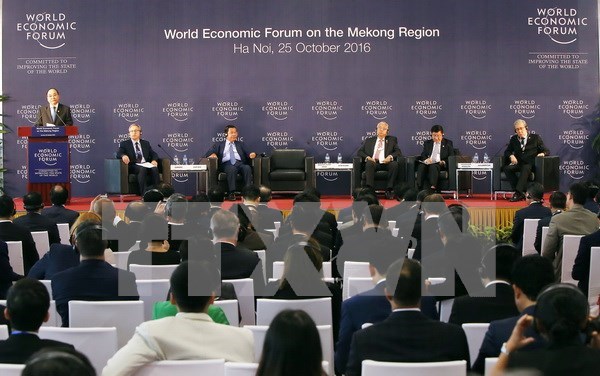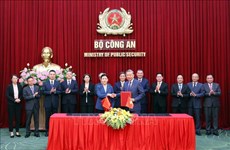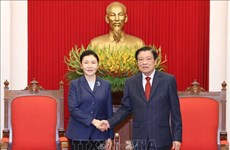PM stresses economic, infrastructure connectivity in Mekong region
Countries in the Mekong region should enhance their economic and infrastructure connectivity and particularly develop complete sub-regional economic corridors, said Prime Minister Nguyen Xuan Phuc.
 PM Nguyen Xuan Phuc speaks at the World Economic Forum on the Mekong Region (Source: VNA)
PM Nguyen Xuan Phuc speaks at the World Economic Forum on the Mekong Region (Source: VNA)Addressing the World Economic Forum on the Mekong Region (WEF-Mekong) in Hanoi on October 25, the PM urged the regional countries to foster their cooperation in a bid to facilitate trade, investment and tourism.
At the same time, priorities should be given to boosting innovations and creations to improve productivity and optimising opportunities afforded by the fourth industrial revolution, he said.
The leader appealed to the nations to hasten the implementation of sustainable development goals (SDGs), including the sustainable management and use of the Mekong River’s water resources.
The move aims to build a Mekong region of peace and stability in security and politics, dynamism and connectivity in economy, sustainability in the environment and harmony in social affairs, he noted.
He stressed that Vietnam is making every effort in restructuring the national economy and reforming its growth model while proactively and actively integrating into the world, citing the country’s constructive engagement in negotiations, signing and implementation of many free trade agreements.
The Vietnamese Government will continue to improve investment and business climate for enterprises in and outside the region, and step up public-private partnerships for sustainable development of the country and the region at large, he promised.
The WEF-Mekong, themed “Greater Mekong Subregion Development: Investment in infrastructure , human resources and connectivity”, was also attended by Cambodian PM Samdech Techo Hunsen, Lao PM Thongloun Sisoulith, Myanmar President Htin Kyaw and Thai Deputy PM Somkid Jatusripitak, along with economic ministers of the Mekong countries, representatives of businesses and groups, experts and scholarships.
Other delegates pointed out that the Mekong region has potential to become a new production centre of Southeast Asia and the world as well.
The Mekong countries boast various reciprocal advantages that can facilitate economic integration and connectivity, the development of regional value chains and their connectivity with nations in Southeast Asia and the world, they said.
They made proposals to enhance economic and infrastructure in the Mekong region, especially transport infrastructure along sub-regional economic corridors, facilitate trade, investment and tourism, develop high-quality human resources and boost cooperation in luring investments in and outside the region.
Some said the Mekong region is facing challenges generated by industrialisation and development such as unsustainable use of natural resources, environmental degradation and widening gap between the rich and the poor.
Speaking at a session concluding the function, Deputy Prime Minister and Foreign Minister Pham Binh Minh stressed sustainable and inclusive development as the top priority of the Mekong region.
He said Mekong countries need to boost cooperation in narrowing the development gap and foster sustainable growth, particularly in the management of Mekong River water resources.
He stated these countries should take advantage of regional and international trade agreements to effectively join value chains, thus stimulating growth and global connectivity.
New technologies are offering abundant opportunities for enterprises in developing countries across the Mekong region, he noted, adding that creating favourable business climate, encouraging startups and innovative ideas as well as developing high-quality workforce should be prioritised to seize the chances of the fourth industrial revolution.
On the sidelines of the conference, Prime Minister Nguyen Xuan Phuc had a meeting with Richard Samans, Member of the WEF Managing Board.
He lauded the collaboration between the WEF and Vietnam in organising the WEF-Mekong, requesting the organisation to consider working with Vietnam in holding the conference regularly in the future as it will improve partnership between Mekong nations and WEF member businesses.
For his part, Samans thanked the Vietnamese Government for its coordination with the WEF in preparing for the conference and said his organisation is looking forwards to working with the country when it comes to WEF initiatives and programmes.
The WEF-Mekong, initiated by Vietnam, is expected to offer new cooperation opportunities for leading firms in the region and the world, thereby helping to attract capital for infrastructure development and connectivity enhancement in the Mekong region. This is the first time WEF has held a separate forum on the Mekong region, reflecting the interest of its member corporations in the region’s potentials.
The same day, PM Phuc and his spouse hosted a gala dinner for participants of the three Mekong conferences.-VNA













